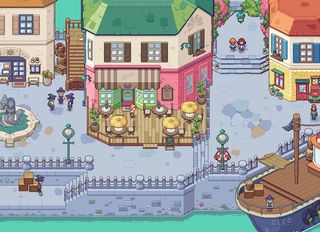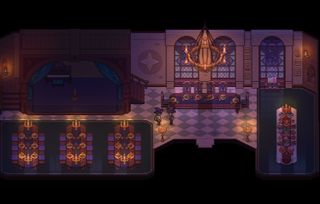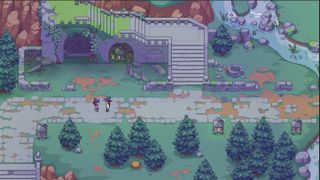Chucklefish's magic school RPG: more details on dating, combat and influences
The developer tells us more about Spellbound (working title), its next long-term project.

I visited Starbound developer and Stardew Valley publisher Chucklefish last week to play Wargroove, its upcoming turn-based strategy game. I'll have some detailed impressions on that later on this week, but while I was there, I couldn't resist asking about its as-yet-untitled (and unannounced) magic school RPG/life sim. Last time we covered this game it got an enormous response, so I thought readers might enjoy these insights on the game's dating system, combat and influences.
During the interview, the staff referred to this project as 'Spellbound', a working title that's been doing the rounds for a while now, so that's how I'll refer to the game here. This is still very early on in development—founder and director Finn Brice says a formal announcement is "maybe quite a way off", and suggests that it's around a three-to-four year project in total. Chucklefish is happy to talk about the game now because its developers like being transparent about their creative process, in what's often a bizarrely secretive industry.
Wargroove is referred to as a smaller Chucklefish project, relatively speaking—six or seven people are working on it, with a release date targeted for early next year. Meanwhile, around nine or ten people are already working on Spellbound, and like Wargroove, it's partly inspired by games from old Nintendo consoles.
"There’s a whole mixture of them," says CEO Finn Brice when I ask about Spellbound's influences. "The most obvious ones were Harvest Moon and Stardew Valley, there’s a lot we learned from that. I think the biggest thing we learned from Stardew Valley is that there’s an inherent value in [having] a game world that’s just charming to be in. Before you even start talking about the gameplay and the mechanics and everything else, am I in love with this game world? How do I achieve that? How do I put together a game world that really hits home, [that] I just want to spend my time in?"

"But inside and on top of that there’s a bunch of different facets of gameplay, and I think all of those are drawn on in individual games as well," Brice continues. As it currently stands, the game's combat will draw from 2D Zelda games. "For example—a lot of this is still early days, so a lot of this is still open to change and everything—but when we look at our combat system, we’re [asking], 'what about traditional top-down Zelda-style gameplay? What did that look like? How can we refine that, how can we bring that forwards?'" Like Wargroove, Chucklefish is looking to modernise rather than just borrow.
"This project is really a culmination of what we do, in bringing games forward and addressing lots of them in one project," Brice explains. "That said, while visually it’s drawing on a lot of games of yesterday, it’s very unique. It’s very us."
When it comes to world building, Brice says the game is pretty far along. "We have an entire game world, and in fact the entire game world minus a couple of areas is entirely explorable, and you can move around it. We have our entire cast of characters. We know far too much about all of their personalities."
The biggest gaming news, reviews and hardware deals
Keep up to date with the most important stories and the best deals, as picked by the PC Gamer team.
"We had personality tests done for all of them!" says Molly Carroll, community and marketing manager at Chucklefish. "We went really deep, it’s quite scary," laughs Brice.
"We know about the larger, overarching world stuff," says Brice. "That said, it’s not really a game about that. It’s not trying to be high fantasy, it’s not trying to tell a particularly dramatic story. It's in that Harvest Moon/Stardew Valley vein of, here’s a world, enjoy being in it, learn something from it, maybe make it your own a bit. But we know all of the surrounding lore now, more or less."

At the moment, Chucklefish is figuring out what amusing situations they can put these characters into. Spellbound's dating system will be more true-to-life, rather than playing out as an idealised romance, with some of the perils that come with that. "Where other games are inviting you to live out your perfect fantasy in that you can date whoever you want, you can get married to whoever you want and it’s up to you, Spellbound is a little less forgiving. Dates can go wrong, things can go wrong, it’s more about that school experience. You might get a few hard knocks."
"We want people to say, 'oh, this is too real. I play this game for escapism and I feel like an awkward teenager going to school again!" says artist and designer Jay Baylis. "I think it’s more fun when suddenly you’re caught off-guard and you thought you were living an idealised life and these characters have their own independence."
"Yeah, I think that’s key," Brice adds. "The characters are a bit more independent, you might get dumped if you behave the wrong way." Don't necessarily expect Riverdale with witches and wizards, though. "We want to hit close to home, but in a way provokes that intense nostalgia. But ultimately you’re not going to have a horrific time, and it’s going to work out in the end—and you’re a wizard right? It can only go so badly!"
"It’s very young adult literature in a lot of ways," says Baylis. "We’re taking that idealised heroism away from you and you’re just another awkward teenager at a school of awkward teenagers."
"I think it’s worth pointing out that we’re, in general, not just out of coincidence, a young company," says Brice. "Most of the people around here are very young, and I think this is a game that comes out of their personal experiences, so it definitely has that going on."
The idea of a magic school combined with the game's look led people to assume Spellbound was inspired by the anime Little Witch Academia, but that's not the case, as the developers told me before. Baylis elaborated on why people made that comparison during our conversation last week. "I like to put it down to everyone [getting] excited about the magic school flavour of the month, so if this was ten years ago it would have been, 'oh this is just like Harry Potter' and now it’s, 'this is just like Little Witch Academia.' In ten years [it’d] be something else."
There's no better time for a game like this, and these early looks at the game's world and characters have produced a pretty amazing reaction. Look out for my upcoming Chucklefish profile piece on PCG in the near future, where the team discusses the idea of being commercially minded as an indie developer, how the studio picks its future projects and more.
Most Popular

